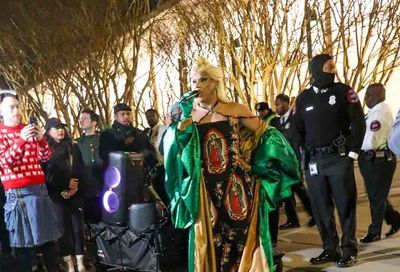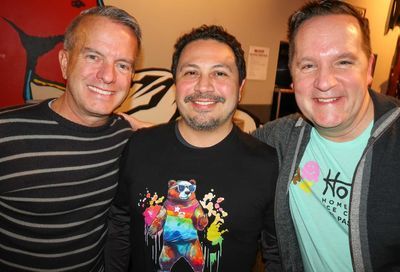Money Changes Everything?
Day 4 of Proposition 8 trial focuses on economic impact of anti-gay policy, as well as psychological toll
SAN FRANCISCO – The discussion at the Proposition 8 trial Thursday swung from the economics to mental health. In between, it covered everything from how the mental health of San Francisco gays stacks up to that of gays in Massachusetts to how most gays feel when they need to fill out a form that requires them to identify their marital status.
Each inquiry had its legal purpose. The legal team opposing the anti-gay ballot measure that amended the state constitution to recognize only male-female marriages tried to illustrate the harm and the hateful motivation behind Proposition 8. The legal team defending the law tried to demonstrate that the world had changed very little as a result of the new law.
In the morning, it was mostly a numbers game: Plaintiffs invited San Francisco’s chief analyst for the economic impact of legislation, Edmund Egan, to explain how Proposition 8 cost the city and county and its gay and lesbian citizens dearly. The city hotels, he said, were losing about $2.6 million a year because same-sex couples weren’t holding wedding receptions and hosting family members there. In the few months that same-sex couples could get married in San Francisco, more than 800 a month did so — 5,100 in all between June 17 and Nov. 4, 2008, when voters approved the initiative. (That’s about 28 percent of the 18,000 statewide.) And the money they spent on weddings during those four months translated into a yearly rate of about $21 million.
There were indirect financial losses, too, said Egan. Because studies indicate that marriage contributes to an individual’s well-being and his or her ability to accumulate wealth, individual gay men and lesbians were failing to realize a better economic status and thus had smaller obligations to the tax revenue. The stigmatization of Proposition 8 increased the bullying of students on the basis of their sexual orientation, said Egan, prompting more absences — absences that reduced the amount of money provided to the schools.
Peter Patterson, an attorney for the team defending Proposition 8, tried to get Egan to acknowledge that many same-sex couples have ceremonies to recognize their domestic partnerships, but Egan said he didn’t know that to be true. He even tried to suggest that the sudden drop in the number of same-sex couples applying for marriage licenses after Proposition 8 passed might suggest the gay community’s interest in marriage was waning.
Patterson also tried to combine Egan’s testimony with interim Census data on the number of same-sex households in San Francisco to suggest Egan had vastly overestimated the economic toll of Proposition 8. That Census data showed 9,624 same-sex households in San Francisco, but Egan’s data, as extrapolated by Patterson, predicted 14,599 weddings by San Francisco residents.
But on re-examination, plaintiff attorney Christine Van Aken enabled Egan to point out that there is no data to indicate that ”everyone who gets married lives together before marriage” and that there was no reason to attribute the drop in same-sex couples applying for marriage licenses in San Francisco after Nov., 2008, to anything other than the passage of Proposition 8.
The second witness of the day was Columbia University researcher Ilan Meyer, a specialist in research into the effects of discriminatory political structures on the mental health of lesbians, gays and bisexuals. He appeared to be walking a fine line between saying gay people do not suffer from a greater incidence of mental illness than the general population and saying that Proposition 8 (as well as other things that stigmatize gays) cause a greater incidence of mental health issues for gays and lesbians.
The apparent purpose of the testimony was to illustrate the harm done by Proposition 8 by the message of hate it conveys to the public at large and the gay community specifically.
When a gay person must fill out a form and is asked to indicate their marital status, said Meyer, there’s harm.
”Filling out forms – what’s the big deal about filling out a form?” said Meyer. ”But for gay people…it’s not about the form. It’s about the social disapproval” the form evokes because gay people in relationships cannot indicate they are married.
”What kind of form are you talking about,” asked Judge Vaughn Walker.
”Any kind of administrative form one might have to fill in,” said Meyer, such as a form at the doctor’s office, a job application, or a lease.
”What [gay people] experience,” said Meyer, ”is that ‘There’s no place for me.’ So, they might say ‘Single’ even though they’ve been in a relationship for 40 years, maybe because they think they don’t want to get into [coming out to] a clerk. Or they have to cross off and write in things.”
It’s not demanding to have to cross something off and write something else,” said Meyer, ”but for a gay person, what it means is social rejection.
”Proposition 8 by definition blocks [gays] from marriage,” he said, forcing them ”to explain why they are not married” and leaving them with the feeling that ”my status is not respected.”
”Proposition 8 sends the message that gay relationships are not to be respected, that they are of secondary value, if any at all,” said Meyer, ”and not equal to that of heterosexuals. In addition to not allowing gays to marry, it sends a message about the values of the state — and it is a message that would encourage wholly prejudicial attitudes.”
Strangely, however, Meyer seemed to undermine much of this important testimony. It was late in the day, an hour and a half past the normal adjournment time, and Meyer had been on the witness stand for about four hours. Most of that time had been under tedious and repetitious questioning cross-examination by defense attorney Howard Nielson who had to be repeatedly asked by the court recorder to slow down and repeat things. At last, Nielson appeared to be wrapping up when he popped one last question: ”You talked about Proposition 8 sending a message about the value of gay and lesbian relationships,” said Nielson. ”Did you mean to offer an opinion about the purposes of those who drafted Proposition 8?”
”No,” said Meyer.
Judge Vaughn Walker, who is presiding over the trial, will make the initial determination as to whether Proposition 8 is motivated by hate or by some governmental need.
Walker acknowledged in court this morning that a U.S. Supreme Court ruling this week prohibits him from making videotape or closed-circuit broadcast of the proceedings available beyond the San Francisco courthouse itself. But he rejected a request by Charles Cooper, the lead defense attorney, to stop videotaping of the proceedings for the judge’s own use in making his decision.
© 2010 by Keen News Service.
Support Metro Weekly’s Journalism
These are challenging times for news organizations. And yet it’s crucial we stay active and provide vital resources and information to both our local readers and the world. So won’t you please take a moment and consider supporting Metro Weekly with a membership? For as little as $5 a month, you can help ensure Metro Weekly magazine and MetroWeekly.com remain free, viable resources as we provide the best, most diverse, culturally-resonant LGBTQ coverage in both the D.C. region and around the world. Memberships come with exclusive perks and discounts, your own personal digital delivery of each week’s magazine (and an archive), access to our Member's Lounge when it launches this fall, and exclusive members-only items like Metro Weekly Membership Mugs and Tote Bags! Check out all our membership levels here and please join us today!






















